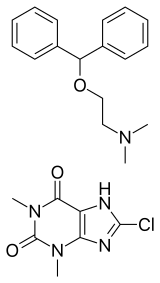Dimenhydrinate
Dimenhydrinate, marketed as Draminate, Dramamine and Gravol among others, is an over-the-counter drug used to treat motion sickness and nausea. Dimenhydrinate is a combination drug of diphenhydramine and 8-Chlorotheophylline.[1]
 | |
| Combination of | |
|---|---|
| diphenhydramine | antiemetic |
| 8-chlorotheophylline | stimulant |
| Clinical data | |
| Trade names | Draminate, Gravol, Dramamine, others |
| AHFS/Drugs.com | Monograph |
| MedlinePlus | a607046 |
| Pregnancy category | |
| Routes of administration | Oral, rectal, intravascular, intramuscular |
| ATC code | |
| Legal status | |
| Legal status | |
| Identifiers | |
| CAS Number | |
| PubChem CID | |
| DrugBank | |
| ChemSpider | |
| UNII | |
| KEGG | |
| ChEBI | |
| ChEMBL | |
| CompTox Dashboard (EPA) | |
| ECHA InfoCard | 100.007.593 |
| | |
It is most commonly prepared as tablets, although it is also available in liquid form and as a suppository.
Medical uses
Diphenhydramine is the primary constituent of dimenhydrinate and dictates the primary effect. The main difference relative to pure diphenhydramine is a lower potency due to being combined with 8-chlorotheophylline. By weight, dimenhydrinate is between 53% to 55.5% diphenhydramine.[2]
Nausea
Dimenhydrinate (marketed as Gravol in Canada and Dramamine in the United Kingdom and the United States) is an over-the-counter (OTC) antihistamine indicated for the prevention and relief of nausea and vomiting from a number of causes. It is an H1 receptor antagonist that demonstrates anticholinergic activity.[3]
Recreational use
Dimenhydrinate is recreationally used as a deliriant.[4][5][6] Slang terms for Dramamine used this way include "drama", "dime", "dime tabs", "D-Q", "substance D", "d-house", and "drams".[7] Abusing Dramamine is sometimes referred to as Dramatizing or "going a dime a dozen", a reference to the amount of Dramamine tablets generally necessary for a trip.[8]
Many users report a side effect profile consistent with tropane alkaloid (e.g. atropine) poisoning as both show antagonism of muscarinic acetylcholine receptors in both the central and autonomic nervous system, which inhibits various signal transduction pathways.[5] In the CNS, diphenhydramine readily crosses the blood–brain barrier, exerting effects within the visual and auditory cortex.
Other CNS effects occur within the limbic system and hippocampus, causing confusion and temporary amnesia due to decreased acetylcholine signaling. Toxicology also manifests in the autonomic nervous system, primarily at the neuromuscular junction, resulting in ataxia and extrapyramidal side effects and the feeling of heaviness in the legs, and at sympathetic post-ganglionic junctions, causing urinary retention, pupil dilation, tachycardia, irregular urination, and dry red skin caused by decreased exocrine gland secretions, and mucous membranes. Considerable overdosage can lead to myocardial infarction (heart attack), serious ventricular dysrhythmias, coma, and death.[9] Such a side effect profile is thought to give ethanolamine-class antihistamines a relatively low abuse liability. The specific antidote for dimenhydrinate poisoning is physostigmine, usually given by IV in a hospital.
Brand names
Dimenhydrinate is marketed under many brand names: in the US, Mexico, and Serbia as Dramamine; in Ukraine as Driminate; in Canada, Costa Rica, and India as Gravol; in Iceland as Gravamin; in Russia and Croatia as Dramina; in South Africa and Germany as Vomex; in Australia and Austria as Vertirosan; in Brazil as Dramin; in Colombia as Mareol; in Ecuador as Anautin; in Hungary as Daedalon; in Sweden as Calma or Arlevert;[10] in Indonesia as Antimo; in Italy as Xamamina or Valontan; in Peru as Gravicoll; in Poland and Slovakia as Aviomarin;[11] in Portugal as Viabom, Vomidrine, and Enjomin; in Spain as Biodramina; in Thailand as Daimenin; in Israel as Travamin; in Pakistan as Gravinate; and in Ethiopia as dimenhydrinate.[12]
Popular culture
Modest Mouse produced a song titled "Dramamine" on their 1996 debut album This Is a Long Drive for Someone with Nothing to Think About. The song uses side effects of the drug as a metaphor for the deteriorating state of a personal relationship.[13]
References
- Putra OD, Yoshida T, Umeda D, Higashi K, Uekusa H, Yonemochi E (29 July 2016). "Crystal Structure Determination of Dimenhydrinate after More than 60 Years: Solving Salt–Cocrystal Ambiguity via Solid-State Characterizations and Solubility Study". Crystal Growth & Design. 16 (9): 5223–5229. doi:10.1021/acs.cgd.6b00771.
- "Dimenhydrinate injection, solution". Daily Med. U.S. National Library of Medicine. Retrieved 19 July 2014.
- Canadian Agency for Drugs and Technologies in Health (2015). "Abuse and Misuse Potential of Dimenhydrinate: A Review of the Clinical Evidence [Internet]". CADTH Rapid Response Reports. PMID 26985532.CS1 maint: uses authors parameter (link)
- "The Health Risks of Abusing Motion sickness pills". Narconon International. Retrieved 2016-09-13.
- Lessenger JE, Feinberg SD (2008). "Abuse of prescription and over-the-counter medications". Journal of the American Board of Family Medicine. 21 (1): 45–54. doi:10.3122/jabfm.2008.01.070071. PMID 18178702.
- Gardner DM, Kutcher S (March 1993). "Dimenhydrinate abuse among adolescents". Canadian Journal of Psychiatry. 38 (2): 113–6. doi:10.1177/070674379303800208. PMID 8467436.
- "The Dangers of Dimenhydrinate Abuse". Bright Hub. 2009-10-06. Retrieved 2016-09-13.
- "Dramamine". Grasscity forums. Retrieved 2016-09-13.
- "Are Teens Abusing Motion Sickness Pills? - Muir Wood Adolescent and Family Services". Archived from the original on 2016-09-18. Retrieved 2016-09-13.
- "Dimenhydrinat" (in Swedish). Fass-verksamheten.
- "Aviomarin, tabletki, 50 mg, 5 szt". Dox.pl (in Polish).
- "Gravinate [Dimenhydrinate]". Karachi Pakistan: The Searle Company Ltd. Archived from the original on 5 May 2013.
- "Modest Mouse: 'This is a long drive...'". Portland. Retrieved 2019-03-26: Glacial Pace Recordings.CS1 maint: location (link)